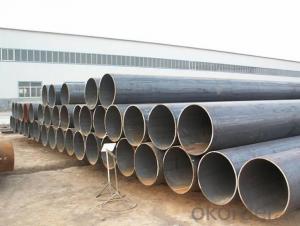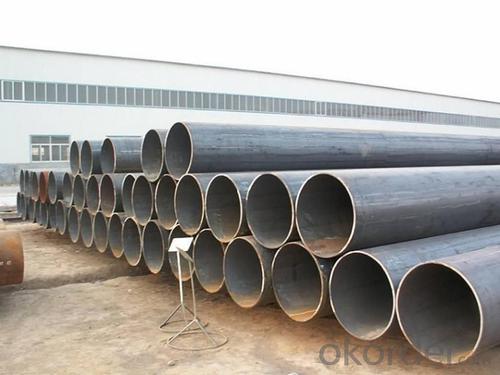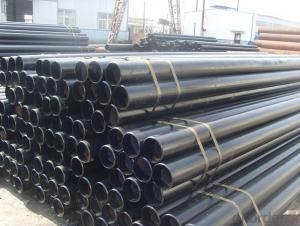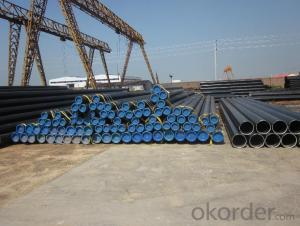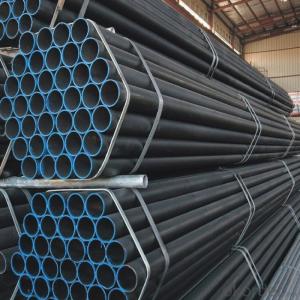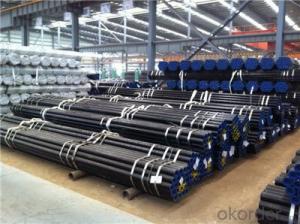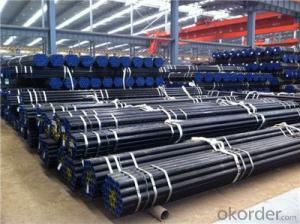CARBON STEEL SEAMLESS PIPES FROM CNBM WITH GOOD PRICE
- Loading Port:
- Tianjin
- Payment Terms:
- TT OR LC
- Min Order Qty:
- 50 m.t.
- Supply Capability:
- 500 m.t./month
OKorder Service Pledge
OKorder Financial Service
You Might Also Like
Product Description:
OKorder is offering high quality Seamless Steel Alloy Pipe at great prices with worldwide shipping. Our supplier is a world-class manufacturer of steel pipe, with our products utilized the world over. OKorder annually supplies products to European, North American and Asian markets. We provide quotations within 24 hours of receiving an inquiry and guarantee competitive prices.
Product Applications:
Seamless Steel Alloy Pipe is ideal for long distance oil, gas, and natural gas pipelines on land and offshore. They can also be applied in construction projects, offshore platforms, power stations, the petrochemical industry and municipal construction.
Product Advantages:
OKorder's Steel Pipe is durable, resists corrosion and is recyclable.
Main Product Features:
· Premium quality
· Prompt delivery & seaworthy packing (30 days after receiving deposit)
· Corrosion resistance
· Professional Service
· Competitive pricing
Product Specifications:
Grade: A213 A335 A199
Certification: Mill test certificate, EN 10204/31B
Dimensions:
Wall Thickness: 0.250" – 4.00" (hot finish), 0.035" – 0.875" (cold drawn)
Outer Diameter: 2" - 30" (hot finish), 0.875" - 18" (cold drawn)
Treatment: Annealed, fully annealed, bright annealed, spheroidize annealed, normalized, stress relieved, cold finished, quenched, tempered
Testing: Chemical component analysis, mechanical properties (ultimate tensile strength, yield strength, elongation), technical properties (flattening, flaring, bending, hardness, impact, etc), exterior size inspection
MOQ: 25 tons
Packaging: Bundle, beveled or plain end, varnish, PVC end caps
Images:
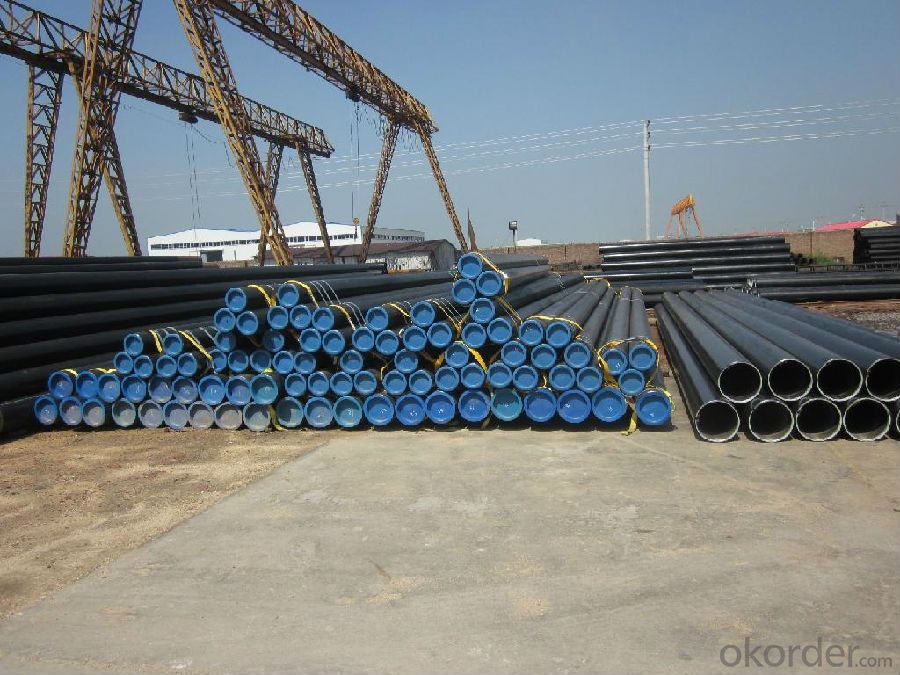
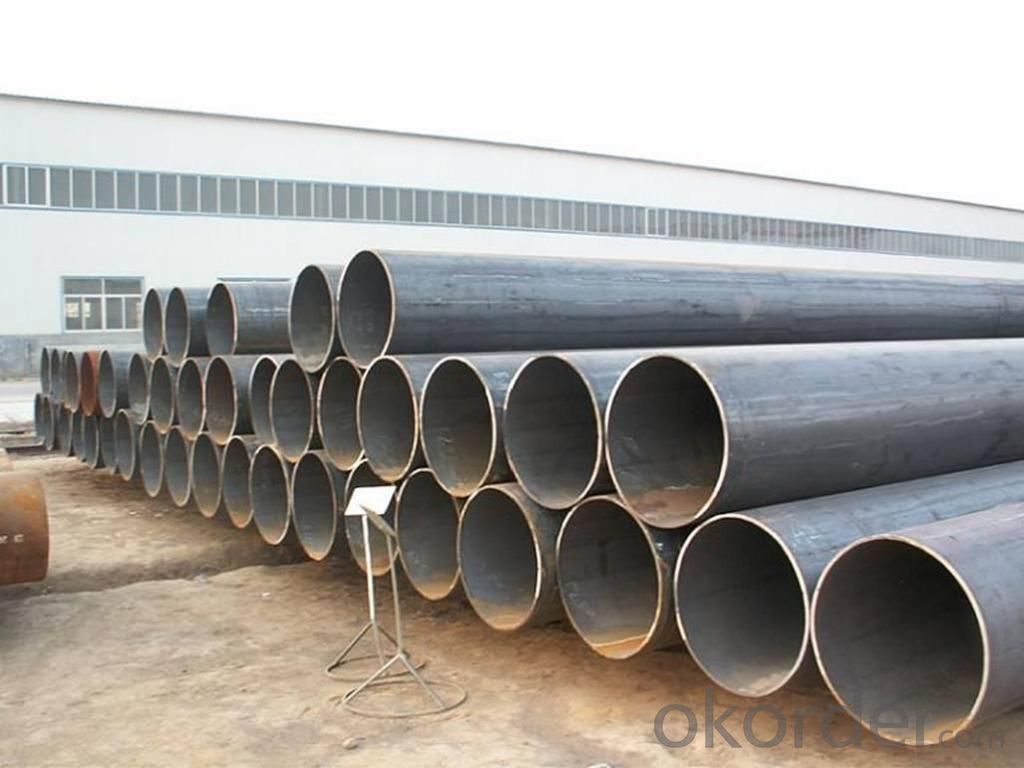
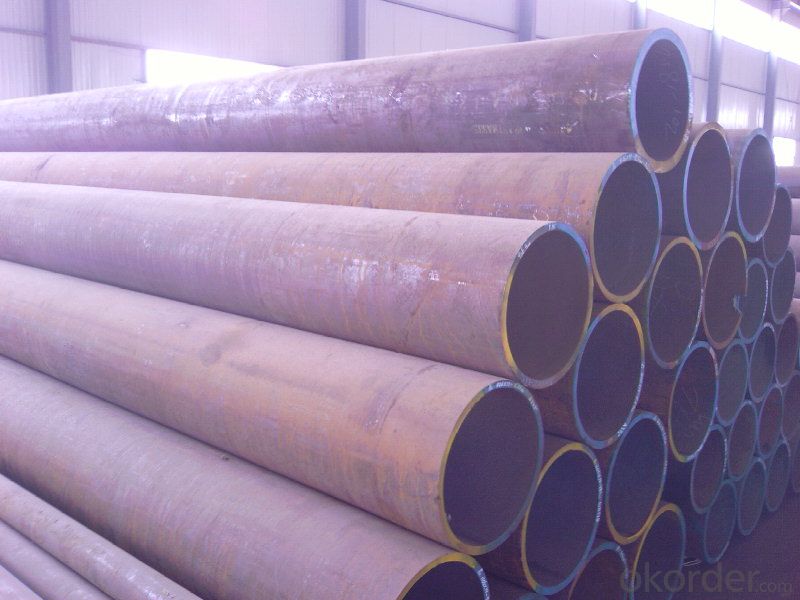
FAQ:
Q1: Why buy Materials & Equipment from OKorder.com?
A1: All products offered byOKorder.com are carefully selected from China's most reliable manufacturing enterprises. Through its ISO certifications, OKorder.com adheres to the highest standards and a commitment to supply chain safety and customer satisfaction.
Q2: How do we guarantee the quality of our products?
A2: We have established an advanced quality management system which conducts strict quality tests at every step, from raw materials to the final product. At the same time, we provide extensive follow-up service assurances as required.
Q3: How soon can we receive the product after purchase?
A3: Within three days of placing an order, we will begin production. The specific shipping date is dependent upon international and government factors, but is typically 7 to 10 workdays.
Q4: What makes stainless steel stainless?
A4: Stainless steel must contain at least 10.5 % chromium. It is this element that reacts with the oxygen in the air to form a complex chrome-oxide surface layer that is invisible but strong enough to prevent further oxygen from "staining" (rusting) the surface. Higher levels of chromium and the addition of other alloying elements such as nickel and molybdenum enhance this surface layer and improve the corrosion resistance of the stainless material.
Q5: Can stainless steel rust?
A5: Stainless does not "rust" as you think of regular steel rusting with a red oxide on the surface that flakes off. If you see red rust it is probably due to some iron particles that have contaminated the surface of the stainless steel and it is these iron particles that are rusting. Look at the source of the rusting and see if you can remove it from the surface.
Q6: What is the difference between galvanized steel and galvalume steel?
A6: Galvanized steel is metallic coated with Zinc in various coating weights. Minimum recommended for painted metal roofs is G90. Galvalume is a zinc and aluminum coated steel that becomes an alloy and is recommended in either painted or bare applications with a minimum coating weight of AZ50. Galvalume has an excellent performance life in bare exposures. Hence if you are using a bare panel use galvalume and if painted use either.
Q7: Is there a difference in thermal conductivity between stainless steel and steel?
A6: Yes. Stainless Steel has a lower thermal conductivity rate than steel; approximately 1/3 to 1/5th depending on the material.
Q8: Is there a difference in electrical conductivity between stainless steel and steel?
A8: Yes. Steel is generally more conductive than stainless steel. Steel has resistivity in the range of 10~20Ωm, while stainless has a resistivity of approximately 60~72Ωm.
- Q: How are steel pipes used in the manufacturing of wastewater treatment systems?
- Steel pipes are used in the manufacturing of wastewater treatment systems for various purposes such as carrying and transporting wastewater, providing structural support to the system, and facilitating the flow of water and chemicals throughout the treatment process.
- Q: What's the difference between straight steel pipe and seamless steel pipe?
- Observe whether there is weld seam. Welded pipe without treatment, there are obvious weld, there are bulges, like scars. A better point will shave off the weld, but there is a distinct difference between the eye and the eye. Also a small number of pipe will be processed after cold rolling, surface roughness and accuracy are relatively high, may be counterfeit seamless pipe sales. Careful observation will still show that the pipe wall will have a continuous spiral, metal luster slightly brighter, that is, the original welding seam, metallographic structure and other parts of the difference. To tell the truth, the layman would have to observe that it might be a little difficult.
- Q: How are steel pipes insulated to prevent freezing?
- Steel pipes are typically insulated using materials such as foam or fiberglass insulation, which are wrapped around the pipes. This insulation helps to prevent freezing by providing a barrier between the cold temperatures outside and the pipes, thus maintaining the necessary heat inside the pipes to prevent freezing.
- Q: What are the different methods of measuring the thickness of steel pipes?
- There are several methods that can be used to measure the thickness of steel pipes, including ultrasonic testing, magnetic particle inspection, eddy current testing, and laser scanning.
- Q: What are the common challenges faced during steel pipe installation?
- When installing steel pipes, there are various challenges that may arise. One of these challenges involves the need to ensure that the pipe sections are properly aligned and fit together correctly. Welding or threading is typically used to join steel pipes, and if the alignment is not precise, it can result in leaks or weak points in the pipeline. To overcome this challenge, it is necessary to use careful measurements and alignment techniques to ensure a secure and tight fit between the pipe sections. Another challenge that arises is dealing with corrosion and rust. Steel pipes are prone to corrosion, especially when exposed to moisture or corrosive substances. This can lead to the deterioration of the pipes over time, compromising their structural integrity and increasing the risk of leaks. To address this challenge, it is possible to apply protective coatings or linings to the steel pipes to prevent corrosion and extend their lifespan. Additionally, the weight and size of steel pipes can pose a challenge during installation. Steel pipes are heavy, and it can be physically demanding to maneuver and position them. Moreover, the large diameter of some steel pipes makes it difficult to transport and handle them in tight spaces or through narrow pathways. Overcoming this challenge often requires the use of heavy machinery, such as cranes or forklifts, to lift and position the pipes correctly. Lastly, environmental factors can also present challenges during steel pipe installation. Extreme temperatures, harsh weather conditions, or unstable soil conditions can impact the installation process. For example, freezing temperatures can make it challenging to weld the pipes, while unstable soil may require additional reinforcement or stabilization measures to ensure the longevity of the pipeline. In conclusion, the challenges commonly faced during steel pipe installation include the need for proper alignment, the issue of corrosion and rust, the handling of the weight and size of the pipes, and the consideration of environmental factors. Overcoming these challenges requires careful planning, attention to detail, and the utilization of appropriate techniques and equipment.
- Q: Welded and seamless steel pipe how to distinguish?
- Different uses:Mainly used for seamless pipe or structural parts of the transmission fluid, mainly used in machinery industry, and seamed steel pipe is mainly used in the construction industry, such as water, gas, compressed air and low pressure fluid. But seamless steel tubes are used in all pressure pipes.
- Q: How are steel pipes used in construction?
- Steel pipes are commonly used in construction for various purposes such as structural supports, plumbing systems, and underground utility installations. They provide strength, durability, and flexibility, making them suitable for carrying fluids, gases, and structural loads. Steel pipes are often used in the construction of buildings, bridges, and infrastructure projects, ensuring reliable and long-lasting performance.
- Q: How are steel pipes used in the manufacturing of desalination plants?
- Steel pipes are used in the manufacturing of desalination plants for various purposes such as transporting seawater, brine, and treated water within the plant. They provide durability, corrosion resistance, and the necessary strength to withstand high-pressure conditions, ensuring the efficient operation and long-term reliability of the desalination process.
- Q: How are steel pipes used in the manufacturing of power distribution systems?
- Steel pipes are commonly used in the manufacturing of power distribution systems as they provide a reliable and durable solution for transporting and protecting electrical cables. They are used to create conduits that house the cables, ensuring safe and efficient transmission of electricity throughout the system. Steel pipes also offer resistance to corrosion, fire, and extreme weather conditions, making them a suitable choice for power distribution systems.
- Q: What are the different methods of wrapping steel pipes for corrosion protection?
- There are several methods used for wrapping steel pipes to provide corrosion protection. These methods include the use of tapes, shrink sleeves, liquid coatings, and powder coatings. Each method has its advantages and disadvantages, and the choice of wrapping method depends on factors such as the environment, the required level of protection, and the budget.
Send your message to us
CARBON STEEL SEAMLESS PIPES FROM CNBM WITH GOOD PRICE
- Loading Port:
- Tianjin
- Payment Terms:
- TT OR LC
- Min Order Qty:
- 50 m.t.
- Supply Capability:
- 500 m.t./month
OKorder Service Pledge
OKorder Financial Service
Similar products
Hot products
Hot Searches
Related keywords
